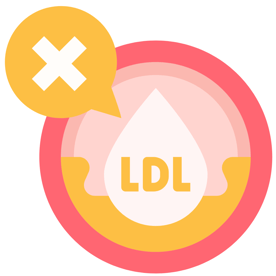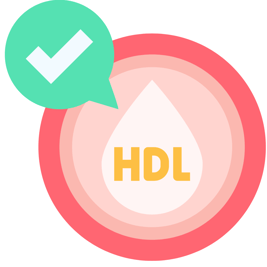What is Cholesterol?
Cholesterol is a fat-like substance produced in the body by the liver. There are also sources of cholesterol from the foods we eat, called dietary cholesterol. Foods that are richer in dietary cholesterol include animal proteins, eggs, full fat dairy, and some highly processed foods/meats. Cholesterol has numerous important uses in the body such as hormone production, transportation of nutrients such as fatty acids, digestive aid such as bile acids production, and certain functions within cell membranes. While cholesterol is an essential component in our body, cholesterol in excess can be dangerous. Elevations in blood cholesterol can lead to accumulation of a waxy like substance, called plaque, which can build up in arteries. This buildup could lead to cardiovascular diseases. See Cardiovascular Diseases: Explained for more information.
Getting Your Cholesterol Checked
When your cholesterol levels are checked at the doctor’s office, usually called a lipid panel, they monitor a few different types of cholesterols and fats: LDL, HDL, triglycerides, and total cholesterol. The total cholesterol level is the overall amount of cholesterol present in your blood at time of testing, including both LDL and HDL levels.
LDL Cholesterol
Low-density lipoprotein, or LDL, often referred to as “bad cholesterol” gets it bad reputation from causing plaque formations when circulating in high amounts. LDL carries cholesterol from the liver to various places in the body for use. When levels are too high, it can lead to plaque buildup in the blood vessels. This buildup can lead to narrowing in the vessels and ultimately result in cardiac events such as heart attacks, or strokes.
HDL Cholesterol
High-density lipoprotein, or HDL, is referred to as “good cholesterol” because higher levels of HDL have been shown to be cardioprotective. This is because higher levels lower your risk of developing heart disease. HDL collects excess cholesterol from the bloodstream, particularly from the arteries. It then carries this cholesterol back to the liver, where it is processed and eliminated from the body.
Triglycerides
Another important component of the lipid panel is Triglycerides. Triglycerides are a type of fat in the blood that your body can use for energy. When excess calories are consumed during a meal and not immediately used by the body, it is stored for future use as triglycerides. The triglycerides are stored in fat cells of the body. Elevated triglyceride levels have been associated with obesity, metabolic syndromes, and type 2 diabetes.
What Should My Cholesterol Levels Be?
“Normal” or goal ranges on a lipid panel will vary slightly depending on individual risk factors, but this general table below from the Cleveland Clinic website is a good indication of if your levels are in an acceptable range. Always check with your health care provider if you are concerned about your lab results.
What About Lp(a)?
In addition to the traditional lipid panel often drawn by providers, there is a blood test that measures Lp(a) or Lipoprotein (a). Lipoprotein (a) is a cholesterol rich substance made in the liver, its production rate is strongly determined by genetics. Individuals with elevations in Lp(a) are at an increased risk for cardiovascular disease. Regular monitoring of Lp(a) is not routine because there are no approved treatment options for lowering Lp(a) to date; however, the exciting news is that there are clinical trials being conducted with drug compounds that may help to lower Lp(a) levels, and in theory, reduce the risk of having a cardiovascular event. See our blog post: Lp(a), a New Lab Test for Cardiovascular Risk for more details about this topic.
Clinical Trials
If you have been told you have high cholesterol, or elevated triglycerides levels, it is important to speak with your doctor about lifestyle modification, and/or medications that can reduce your risk of developing cardiovascular diseases. At Chase Medical Research, we are enrolling for several clinical trials that are investigating different drugs to lower LDL cholesterol, triglycerides, and to reduce cardiovascular risks. Call us today at (203) 419-4404 to find out if you are eligible to participate in this cutting-edge research!
Sources:
- Mayo Clinic Staff. HDL cholesterol: How to boost your 'good' cholesterol. Nov. 07, 2024. https://www.mayoclinic.org/diseases-conditions/high-blood-cholesterol/in-depth/hdl-cholesterol/art 0046388#:~:text=High%2Ddensity%20lipoprotein%20(HDL),lower%20risk%20of%20heart%20disease. Accessed 27FEB2025
Share This Post
Recent Posts
- The Relationship Between Obesity and Obstructive Sleep Apnea April 30 2025
- Cardiovascular Outcome Clinical Trials April 30 2025
- Diabetic Peripheral Neuropathic Pain April 30 2025
- Blood Pressure: The Highs, the Lows, and Everything in Between April 30 2025
Categories
- Clinical Trials
- Cardiovascular Disease
- Diabetes
- Obesity
- Kidney Disease
- Hypertension
- Pain Management
- Vaccine
- Cholesterol
- Chronic Obstructive Pulmonary Disease
- Diabetic Peripheral Neuropathy
- Migraine
- Osteoarthritis
- Biologics
- COVID-19
- Gastroesophageal Reflux Disease
- Irritable Bowel Syndrome with Constipation
- Lyme Disease
- Nonalcoholic Steatohepatitis
- Respiratory Syncytial Virus


